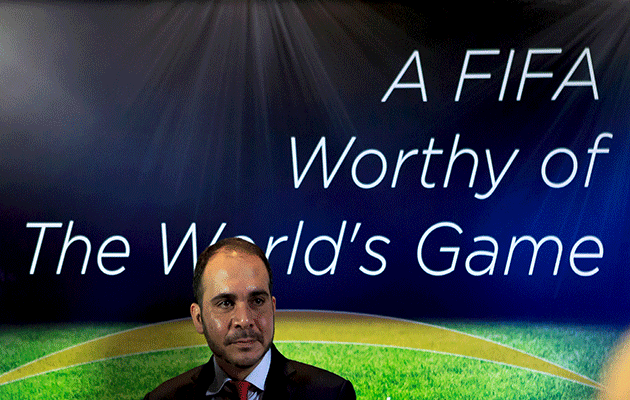Prince Ali is confident he can secure the FIFA presidency second time around now that the long-overwhelming shadow of Sepp Blatter is being blown away by a wind of change.
The Jordanian embarrassed Blatter last May when he prevented the president of the world governing body from scoring a clean first-round knockout in the election in Zurich. Now he believes the scenario is very different ahead of the rerun next February 26.
Prince Ali gained voter traction last May from events two days earlier when the detentions of the ‘Zurich Seven’ began to open up the murky depths of the corruption culture into which many of the game’s most powerful figures had jumped so greedily.
Blatter’s influence has been diminished both by his ethics suspension and his impending departure — along with the power of patronage which had cowed confederation and FA leaders into electoral servility over his 17 years in command.
Here lies the key to Prince Ali’s new-found confidence. He sees the old order as fragmented. Not only Blatter: the late Julio Grondona’s South American acolytes have run for cover, Jack Warner’s CONCACAF banker Jeffrey Webb is under house arrest; UEFA president Michel Platini is suspended and unlikely to return while veteran Spanish refusenik Angel Villar – a long-time Blatter loyalist – is damaged goods.
Irritatingly for Prince Ali, the one confederation in which the old-time power brokers continue to romp freely, is his own Asia. Bahrain’s Sheikh Salman bin Ebrahim Al Khalifa, supported by Kuwaiti Olympic puppeteer Sheikh Ahmad Al-Fahad Al-Sabah, is both Asian confederation president and many observers’ favourite to ascend the FIFA throne.
Prince Ali does not see it that way.
He said: “FIFA needs a new face, people who believe in ethics that make sense for this age and that’s the demand of the whole world. That’s the reason I’m running. I’m there to implement that.
“I will focus on the fact that we need a change of culture at FIFA. What I saw as a member of the executive committee was that the only way to make changes was to make change from the top.
“There are a lot of good people within football and within the staff at FIFA but also it’s important to bring in people and advice from outside as well. We have to reverse the pyramid, put our fans and our players at the top of the pyramid and make FIFA into a service organisation.”
One challenge for Prince Ali is projecting his message to all 209 member associations of FIFA in a comparatively short space of time. This is one reason why he is concerned that the FIFA electoral committee proves an effective policeman of the candidates and their campaign operations.
Change of priorities
Given the best of all possible electoral worlds, he believes the national associations understand his priorities and will no longer feel under pressure from the second floor in the Home of FIFA on how to cast their votes.
Prince Ali said: “I’m probably the only candidate who does have support from all over the world. This is not a confederation election and I am much more confident this time in our national associations because I believe they feel there is a bit of a weight lifted off their shoulders.
“I am very confident because I believe I have the best ideas for what the future of FIFA should be and I have full faith in our national associations that they see me as a presidential candidate for them.”
Prince Ali is coy, like all the candidates, about being too specific about the changes he would make. But he wants representatives of clubs, leagues, players and referees in and around the executive committee and to move forward swiftly with reform.
He blamed a “crisis of leadership” for FIFA’s failure to move forward boldly with proposals from governance guru Mark Pieth and others.
Prince Ali said: “We should no longer be about proposals, we should be about implementation.”
He favours a two-term limit for the president and consideration of term limits for all members of the executive committee. He also believes in new governance strictures to ensure that the exco “is a good gatekeeper for football and not the problem.”
Transparency on pay would be a priority issue. Prince Ali also believes the president should be paid a “reasonable” sum. Presumably this would be some way below the €8m stated recently by one of Blatter’s associates.
This approach also contrasts with Sheikh Salman who has volunteered not to take a salary, thus suggesting that he might prefer to work behind the current curtain on remuneration.
A key member of Prince Ali’s election team is his sister, Princess Haya, who stepped down last year as president of the international equestrian federation, the FEI.
Prince Ali said: “Her advice is critical. She’s done so much in terms of reform for a sports organisation herself. She was one of the first people who implemented the two-term limit within her federation and, if you look at the index for corruption within sports governance, the FEI is No1 in terms of best practice.”
That is what he wants for FIFA.
** The other FIFA contenders: Jerome Champagne (France), Gianni Infantino (Switzerland), Sheikh Salman bin Ebrahim Al Khalifda (Bahrain), Tokyo Sexwale (South Africa).







